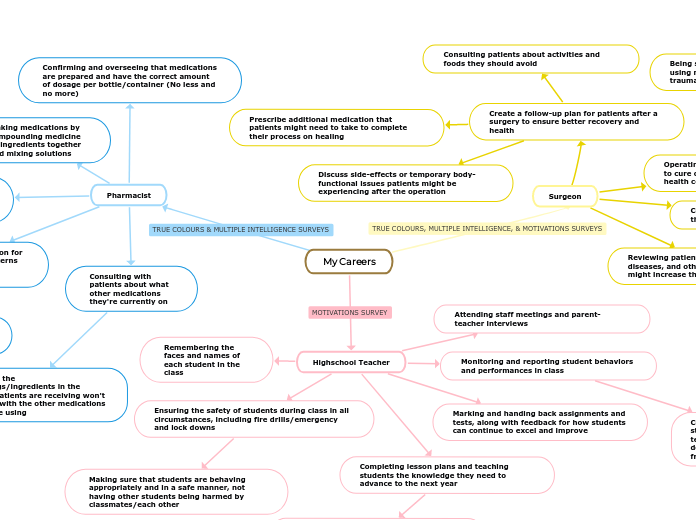My Careers
Pharmacist
Providing and refilling medication for patients' needs and health concerns after analyzing prescriptions prescribed by patients' doctors
Confirming that the quantity of the medication prescribed by the doctor is an appropriate amount and is legal
Discussing with patients how certain medicines work, possible reactions to expect, possible side-effects, and how and when to take the medication(s)
Answering possible questions or concerns patients may have
Informing patients of the amount of dosage of the drug they should be intaking for each day/week/month
Making medications by compounding medicine or ingredients together and mixing solutions
Confirming and overseeing that medications are prepared and have the correct amount of dosage per bottle/container (No less and no more)
Consulting with patients about what other medications they're currently on
Making sure that the compounds/drugs/ingredients in the medication the patients are receiving won't react negatively with the other medications patients might be using
Highschool Teacher
Remembering the faces and names of each student in the class
Ensuring the safety of students during class in all circumstances, including fire drills/emergency and lock downs
Making sure that students are behaving appropriately and in a safe manner, not having other students being harmed by classmates/each other
Completing lesson plans and teaching students the knowledge they need to advance to the next year
Offering help to the students who might need a little more extra guidance and those who don't understand materials taught
Marking and handing back assignments and tests, along with feedback for how students can continue to excel and improve
Attending staff meetings and parent-teacher interviews
Monitoring and reporting student behaviors and performances in class
Coming up with a full written evaluation of students' abilities and grades during mid-terms and finals based off on documentations and notes of what's seen from each student
Surgeon
Consult patients about risks of surgeries, the possibilities of death and success
Reviewing patients' medical history, diseases, and other health conditions that might increase the risks of having surgery
Recommending other methods of cures if surgery is not suitable for the patient
Operating on patients with other surgeons to cure or reduce certain illnesses and health conditions patients have
Being prepared for all results, including failure and deaths of patients
Being skilled with the hands in terms of using medical equipment like scalpels, trauma shears, forceps, scissors, etc.
Create a follow-up plan for patients after a surgery to ensure better recovery and health
Consulting patients about activities and foods they should avoid
Discuss side-effects or temporary body-functional issues patients might be experiencing after the operation
Prescribe additional medication that patients might need to take to complete their process on healing
